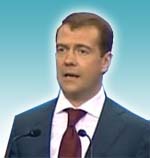Russia looks East after criticism from the West
 Moscow - President Dmitry Medvedev was meeting his Chinese counterpart Hu Jintao and the leaders of four ex-Soviet Central Asian nations on Wednesday in a bid to secure support for Russia its standoff with the West over Georgia.
Moscow - President Dmitry Medvedev was meeting his Chinese counterpart Hu Jintao and the leaders of four ex-Soviet Central Asian nations on Wednesday in a bid to secure support for Russia its standoff with the West over Georgia.
Medvedev flew to the capital of Tajikistan for two days of consultations with his partners in the Shanghai Cooperation Organization (SCO) as Western leaders renewed their condemnation of Russia's diplomatic recognitition of breakaway regions of Georgia.
The SCO was formed in 2001 as a counterweight to NATO's growing influence in the region.
"If we are talking about SCO's move from an economic organization to a military one, then this has already happened ... All the member states were willing in response to the strengthening of NATO," Alexei Mukhin, head of the Moscow-based Centre of Political Information, told Deutsche Presse-Angentur dpa.
With Russian troops still in key positions in Georgia, tension with NATO mounted as a top Russian general accused the alliance of building up its fleet in the Black Sea.
"Can NATO indefinitely build up its forces and means there? It turns out it cannot," Anatoly Nogovitsyn, the deputy chief of Russia's general staff, said at a Moscow briefing.
He said 10 of the alliance's vessels were currently patrolling the Black Sea and eight more were on route to join them.
Medvedev's defiant recognition of Georgia's separatist regions of Abkhazia and South Ossetia, where the conflict erupted early August, has led to a sharp cooling of diplomatic relations.
"We're not afraid of anything, of a new Cold War," Medvedev said on Tuesday. "If our partners want to maintain good relations with Russia, they will understand our decision."
But the move provoked NATO, the United States and some European allies to demand a "reversal" of the decision.
So far, the presidents of Belarus and Syria are the only Russian allies to support the Russian move.
While Georgia is not officially part of the summit agenda in the Tajik capital of Dushanbe, a Kremlin spokesman said it was "obvious" that the issue would take centre stage.
Moscow will be pushing for judicial support, namely from China, and promises of tighter military cooperation from eastern allies.
But analysts said Moscow would have to be satisfied with tacit support or a lack of rebuke.
Russia cannot expect China to recognize Abkhazia and South Ossetia because it faces similar problems with restless regions at home, analyst said.
"But silence on this question will de facto mean agreement, and, more importantly, China will move to block any economic sanctions against Russia within the UN," Mukhin said.
China and Russia's competition for influence within the SCO also complicates any potential for rapprochement.
The two nations hold different visions of what should become of the organization, with China aiming for an expansion of trade benefits while Moscow wants increased military cooperation.
Kazakhstan and Kyrgyzstan, which hosts both US and Russian military bases, have looked to balance their Russian ties with the United States in recent years and are likely to find this a compromising position.
The Kremlin said in a statement that high on the summit agenda would be reviewing procedures for admitting new members, such as Iran which holds observer status in the club.
The move would snub Washington's drive to isolate the Islamic state, which it suspects of harboring a nuclear weapons programme, while moving closer to realizing Russia's goal of knitting an anti- hegemonic alliance to counter US policy. (dpa)